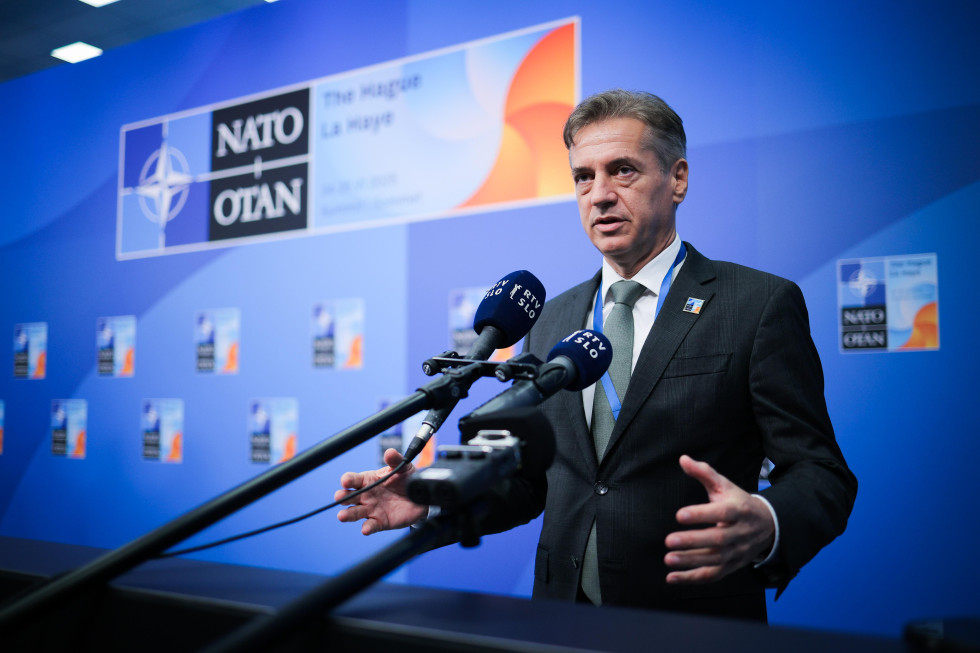Prime Minister Golob: "It is our responsibility to ensure that Slovenia remains a safe country"

Statement by the Prime Minister of the Republic of Slovenia, Dr. Robert Golob, upon arrival | Author Daniel Novakovič/STA
The key topic of this year's meeting is the declaration on defence spending.
In a press release before the start of the meeting, the Prime Minister emphasised the importance of ensuring the security of the Republic of Slovenia. "Slovenia is currently a safe country according to all international rankings. It is our responsibility to keep it this way," stressed Prime Minister Golob.
Slovenia maintains its position among the top ten countries in the Global Peace Index (9th place), which reflects long-term regional stability and effective domestic governance. It has a low level of violent crime, minimal political instability and limited military cooperation.
The Prime Minister went on to welcome the draft Resolution on the overall long-term programme for the development and equipping of the Slovenian Armed Forces until 2040, saying that it meets the expectations of the Alliance. "The negotiations were long and hard. I can say that our preparations have proven very successful. The resolution we adopted in the National Assembly a few weeks ago fully meets all the expectations of the Alliance towards Slovenia," he emphasised.
The Prime Minister pointed out that the definition of eligible defence and security expenditure in the final text of the declaration to be adopted at today's NATO summit in The Hague has been broadened: "We have succeeded in broadening the definition of security to include not only weapons, but also all other elements of security, protection and resilience. We are pleased that we have succeeded in incorporating the concept of broader security into this declaration. This is why we believe that this declaration is fully in line with our goals and we will not oppose it," Prime Minister Golob made clear.
The Prime Minister went on to highlight the importance of a broader understanding of the concept of security, which also includes other challenges facing the modern world. "This is most important for us because we need to build resilience in society, not only because of the current foreign policy situation, but also in preparation for the climate crisis and the food crisis that may arise. The current definition of spending within the Alliance also covers this part," he said.
In the concluding part of his statement, Prime Minister Golob once again emphasised the responsibility that this government has towards all citizens of the Republic of Slovenia in ensuring their safety. "There have been a lot of public appearances in recent weeks. What counts is what Slovenia has managed to negotiate. This is not about performing, this is about showing responsibility to our citizens. And this is the only thing that countrs," concluded Prime Minister Robert Golob.
Slovenia remains devoted to the Alliance's common defensive posture, thus clearly emphasising: all we want is peace.
Prior to the NATO summit, Prime Minister Golob emphasised that Slovenia remains committed to the Alliance's common defence posture, while clearly highlighting the pursuit of peace as a key priority and fundamental orientation. He also welcomed the flexibility achieved in defining necessary defence spending, because this is the only way each country can contribute in its own way to security and to the defence capabilities of the entire Alliance.
Slovenia has achieved everything it set out to do in the negotiations on the final text of the declaration to be adopted at the NATO summit in The Hague. The period for increasing defence spending has been extended to 10 years, and the definition of eligible defence and security costs is very flexible. At the same time, the relevance of these commitments will be reviewed in 2029 in light of the strategic environment at that time.
To supplement the operational capability of the Slovenian Armed Forces within the NATO alliance, 2% of GDP will suffice, as stipulated in Resolution on the overall long-term programme for the development and equipping of the Slovenian Armed Forces until 2040. The draft Resolution was approved by the Government at its 155th regular session and subsequently by the National Assembly. We are therefore pleased that the text of the declaration has been harmonised in a manner that confirms the guidelines and scope of the necessary resources already approved in the Resolution.
We will therefore allocate a total of 2% of GDP to the military and weapons. In addition, the difference to 3.5% of GDP (constituting core defence investments) will be allocated to dual-use programmes such as hospitals, roads, bridges, tunnels, railways, cyber security and advanced technologies. These investments are defined in the 2018 NATO methodology, on which Slovenia's Resolution is also based.
The remaining 1.5% (bringing the total to 5%) may be allocated by each NATO member at its discretion to strengthen resilience, including for civil protection, multipurpose shelters, food security and strategic reserves, research and development, and defence programmes for Slovenian industry that support the country's resilience and security.

